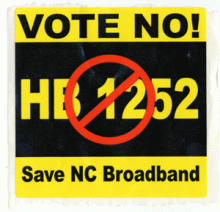By
on

Time Warner, AT&T, and other incumbents have radically changed their strategy to prevent broadband competition in North Carolina via new restrictions that are being debated in the Legislature currently. This switch in strategy offers more proof that they stand on no principle aside from protecting their monopoly.
The famous HB 1252 in North Carolina is back... but different. In the past, the telcos and cablecos have argued that municipal broadband networks are unfair to them because the city could use tax dollars in some way to build the network (ignoring that most publicly owned networks do not use any tax dollars). Now, these companies are pushing a bill to require financing backed by taxpayer dollars. Seems like an odd switcheroo.
As one might expect from companies like AT&T and Time Warner, who have no respect for the public process, the bill was kept top secret until debated in committee, giving only the side filled with monied interests and lawyers an opportunity to prepare. The bill (that we have made available here as there is no official version yet) would not just place significant restrictions on new publicly owned networks, but would also handcuff existing networks like Salisbury and Greenlight in Wilson.
To reiterate, this bill will damage the most advanced broadband networks available in North Carolina today. Sounds like North Carolina wants to take up Mayor Joey Durel in Lafayette on his offer to welcome the businesses moving from North Carolina to Lafayette with a big pot of gumbo.
Fascinating that after an FCC Commissioner noted that the US Broadband Plan recognizes the right for communities to build their own broadband infrastructure, North Carolina is deciding it prefers to preclude any broadband competition, sticking with its last-century DSL and cable. Just fascinating.
The Salisbury Post has been watching and recently published a scathing editorial against the bill. This is one paragraph, but the whole editorial is well worth reading.
Yet, if the HB 1252's intent becomes reality, such areas will be severely hobbled in their near-term ability to tap into the broadband revolution. Private telecommunications companies — in this case, primarily Time-Warner — will determine where services will go and when they will go there. Such decisions will be driven by short-term profits, not a long-range vision of community progress. That's like letting one or two asphalt companies determine the future of North Carolina's roads.I won't go too deeply into the bill because Jay Ovittore at Stop the Cap has already done that. He rightly notes that the bill is an attempt to require a referendum before any new network or refinancing or upgrading of an existing network. These referendums are dominated by incumbents who drop hundreds of thousands into any community to prevent competition.
How can a local city or county government respond to the misinformation barrage? They can’t. Public officials can’t spend taxpayer dollars to promote such projects or refute industry propaganda. They can’t even financially assist a citizen-run campaign. That’s a fight with ground rules only Don King could love.Expanding on Jay's analysis, I would only add that each community is different. Charlotte has different resources and opportunities than Boone. Laws that require all communities to use the same funding mechanism are utterly illogical save for the intention to strait-jacket communities and leave them at the mercy of whatever the private sector wants to offer. Across the country, we have seen a variety of approaches to funding successful broadband networks. Laws that force every community to use the same financial tool or business model result in fewer communities actually building the networks they need. Those that do build networks under such policies have to jerry-rig the network to conform, resulting in greater likelihood that the project will encounter problems. To do all of this to protect massive Fortune 500 companies (with millions of subscribers) from towns with thousands of citizens, is madness. Time Warner and AT&T do not need the protection of legislators in Raleigh. But citizens throughout North Carolina do need broadband networks that put their interests above distant shareholders. Good people in North Carolina are organizing against this - from contacting legislators to passing resolutions in towns to getting statements from businesses. If you can help, drop me a line and I can put you in touch with them. The bill may still be stopped in committee. Update: Follow up coverage here.
File
Geoterm







